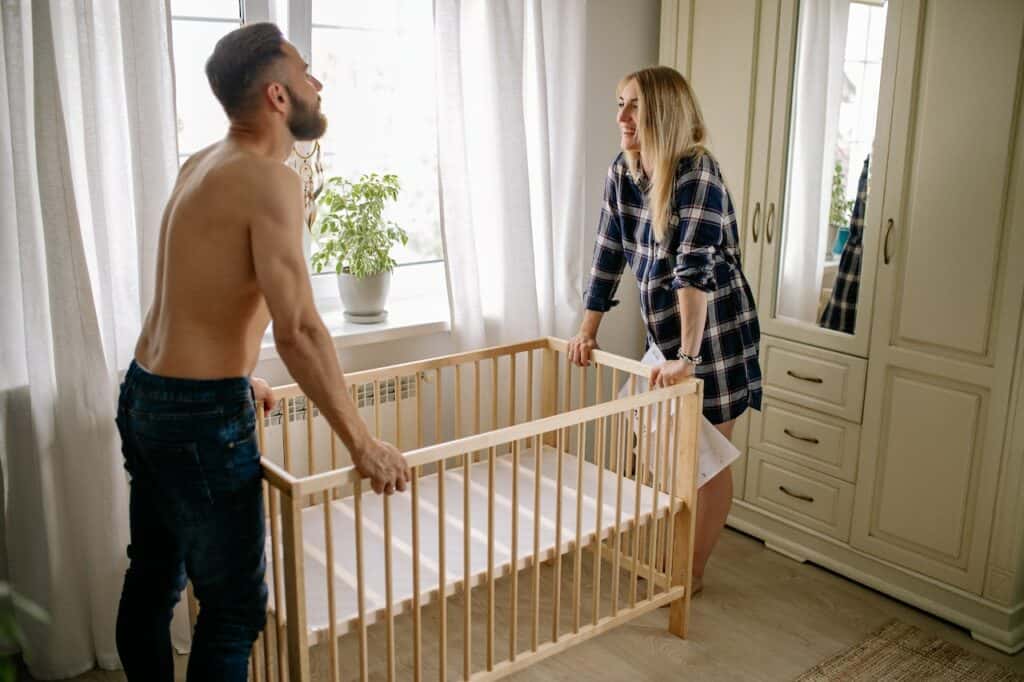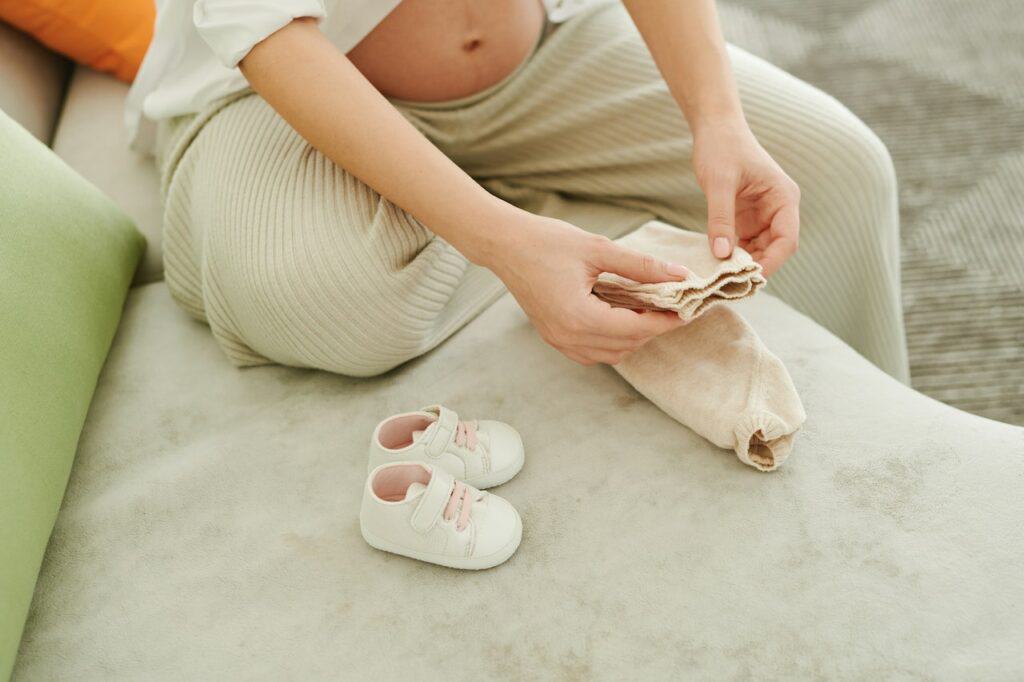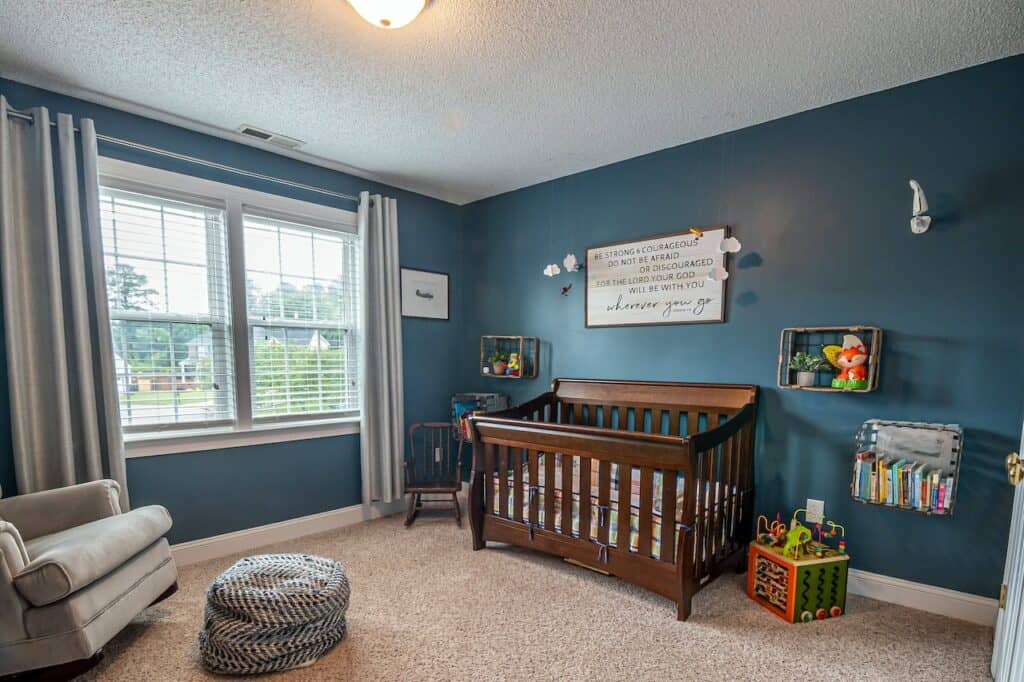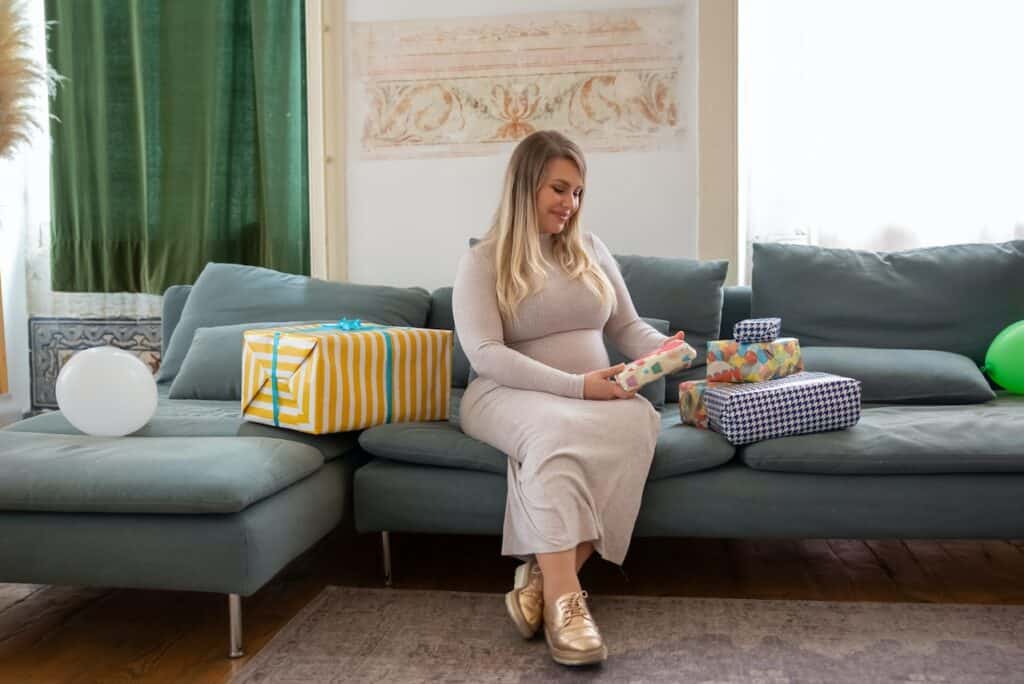Many expectant parents are eager to start shopping for their baby as soon as they find out they are pregnant. However, determining when to start shopping for baby can be a tricky decision. There are several factors to consider, such as the pregnancy timeline, budget, and personal preferences.
Understanding the Pregnancy Timeline is crucial when deciding when to start shopping for baby. It is recommended that expectant parents wait until after the first trimester to start shopping, as this is when the risk of miscarriage significantly decreases. Additionally, knowing the baby’s gender can also impact when to start shopping, as it allows parents to focus on gender-specific items.
Key Takeaways:
- It is recommended to wait until after the first trimester to start shopping for baby.
- Knowing the baby’s gender can impact when to start shopping.
- Budget and personal preferences should also be considered when determining when to start shopping.
Understanding the Pregnancy Timeline
When it comes to preparing for a new baby, timing is everything. Understanding the pregnancy timeline can help expectant parents plan and prepare for the arrival of their little one.
Pregnancy is typically divided into three trimesters, each lasting approximately 13 weeks. During the first trimester, the baby’s major organs and systems begin to develop, and the mother may experience symptoms such as nausea, fatigue, and breast tenderness. It is also during this time that most women find out they are pregnant, typically after a positive pregnancy test.
The second trimester is often considered the “golden period” of pregnancy, as many women experience a decrease in symptoms and an increase in energy. This is also the time when the baby’s movements become more noticeable, and the mother may have her 20-week scan or ultrasound to check on the baby’s growth and development.
During the third trimester, the baby continues to grow and mature, and the mother may experience discomfort and fatigue as she prepares for labor and delivery. It is also during this time that the due date, which is calculated as 40 weeks from the first day of the mother’s last menstrual period, becomes more important.
Keeping a pregnancy journal can be a helpful way to track milestones and document the journey. This can include important dates such as the positive pregnancy test, the first ultrasound, and the due date.
In conclusion, understanding the pregnancy timeline can help expectant parents prepare for the arrival of their new baby. From the excitement of the positive pregnancy test to the anticipation of the due date, each milestone is important and can be documented in a pregnancy journal.
Knowing When to Start Shopping
When it comes to shopping for a baby, timing is crucial. Parents want to make sure they have everything they need before the baby arrives, but they also don’t want to buy things too early and risk having them go unused or outdated. Here are some factors to consider when deciding when to start shopping for a baby.

The Right Time
The general rule of thumb is to start shopping for a baby around the six-month mark of pregnancy. This gives parents enough time to research and purchase the necessary items without feeling rushed or stressed. However, it’s important to keep in mind that every pregnancy is different, and some babies may arrive earlier than expected. In this case, having essential items like a car seat and diapers on hand can be crucial.
The Nesting Feeling
Many expectant mothers experience a nesting instinct, a strong urge to prepare their home for the baby’s arrival. This can include cleaning, organizing, and shopping for baby items. If a mother feels this urge early on in her pregnancy, it’s okay to start shopping earlier than the six-month mark. However, it’s important to prioritize essential items like a car seat and crib before moving on to less necessary items like toys and clothes.
Bad Luck to Buy Baby Stuff Early
Some cultures believe it is bad luck to buy baby items before the baby is born. While there is no scientific evidence to support this belief, it’s important for parents to respect their cultural traditions and beliefs. If a parent feels uncomfortable buying items before the baby is born, they can wait until after the birth to start shopping.
In conclusion, there is no one-size-fits-all answer to when parents should start shopping for a baby. It’s important to consider factors like the right time, nesting instincts, and cultural beliefs when making this decision. Ultimately, parents should trust their instincts and purchase items at a pace that feels comfortable for them.
Planning Your Baby Shopping List
Preparing for a new baby can be overwhelming, especially when it comes to shopping for baby items. To make the process easier, it’s important to start planning your baby shopping list early on. This section will provide some tips and guidelines for creating a comprehensive shopping list for your new arrival.
Baby Checklist
A baby checklist is a great starting point for creating your shopping list. It will help you keep track of all the essential items you need for your baby. You can find many baby checklists online, or you can create your own. Be sure to include items such as:
- Diapers and wipes
- Clothing (onesies, sleepers, hats, etc.)
- Bottles and feeding supplies
- Crib and bedding
- Car seat
- Stroller
- Baby carrier
- Diaper bag
- Bathing supplies (tub, washcloths, towels, etc.)
- Baby monitor
- High chair
Baby Registry Checklist
Creating a baby registry is another helpful way to plan your shopping list. A registry allows you to choose the items you want and need for your baby and share them with friends and family. They can then purchase these items for you, which can be a great help financially. When creating your registry, be sure to include both big-ticket items and smaller essentials.
Research
Researching baby items before making purchases can also save you time and money. Look for reviews and recommendations from other parents, and consider the safety and quality of the items you are considering. Don’t be afraid to ask for advice from friends and family who have already been through the process.
Baby Gear
When it comes to baby gear, there are many options to choose from. Consider your lifestyle and needs when selecting items such as strollers, carriers, and high chairs. Look for items that are easy to use and can grow with your baby.
Baby Essentials
While it’s important to have all the necessary items for your baby, remember that babies grow quickly and may not need everything right away. Focus on the essentials, such as diapers, wipes, and clothing, and add other items as needed.
In summary, planning your baby shopping list early on can help make the process less stressful. Use a baby checklist, create a registry, do your research, and focus on the essentials. With a little preparation, you can be ready to welcome your new bundle of joy with everything they need.
Budgeting for Baby Expenses
When preparing for a new baby, it’s important to create a budget that includes all the necessary expenses. This can help new parents avoid overspending and financial stress. Here are some tips for budgeting for baby expenses:

1. Make a List of Necessary Items
Start by making a list of all the items you’ll need for your baby. This can include things like diapers, wipes, clothing, a crib, a car seat, and more. Once you have a list, research the average prices for each item to get an idea of how much you’ll need to spend.
2. Look for Sales and Discounts
To save money on baby expenses, keep an eye out for sales and discounts. Many stores offer discounts on baby items during certain times of the year, such as Black Friday or Cyber Monday. You can also sign up for store newsletters to receive notifications about upcoming sales.
3. Use Coupons and Promo Codes
Another way to save money on baby expenses is to use coupons and promo codes. Many stores offer coupons that can be used in-store or online. You can also search for promo codes online before making a purchase to see if there are any available discounts.
4. Consider Secondhand Items
Buying secondhand items can be a great way to save money on baby expenses. Look for gently used items at thrift stores, consignment shops, or online marketplaces like Facebook Marketplace or Craigslist. Just be sure to inspect items carefully before purchasing to ensure they’re in good condition.
By following these tips, new parents can create a budget for baby expenses and save money on necessary items.
Choosing Baby Clothes and Essentials
When it comes to choosing baby clothes and essentials, there are a few things to consider. First, it’s important to think about the size of the clothing. Babies grow quickly, so it’s best to buy clothes in a range of sizes to ensure they will have items that fit as they grow.
It’s also important to consider the gender of the baby. While some parents prefer to wait until the baby is born to find out the gender, others like to plan ahead and buy gender-specific clothing. For those who prefer gender-neutral options, there are plenty of cute and stylish options available.
When choosing baby clothes, it’s important to think about the practicality of the items. Onesies and sleepers are great options for newborns, as they are comfortable and easy to put on and take off. Socks are also important to keep baby’s feet warm, but it’s important to choose ones that will stay on and not slip off easily.
In addition to clothing, there are other essentials to consider, such as diapers, wipes, and blankets. It’s a good idea to stock up on these items before the baby arrives, so you have everything you need on hand.
Overall, choosing baby clothes and essentials can be an exciting and fun experience for parents-to-be. By considering the size of the clothing, the baby’s gender (if known), and the practicality of the items, parents can ensure they have everything they need to welcome their new bundle of joy into the world.
Selecting Nursery Furniture and Decor
Selecting the right furniture and decor for a nursery can be an exciting but overwhelming task for new parents. It is important to consider both functionality and style when choosing items for the nursery.

One of the most important pieces of furniture for a nursery is the crib. It is recommended to start shopping for a crib early on in the pregnancy to ensure that it is delivered and assembled before the baby arrives. When selecting a crib, it is important to choose one that meets safety standards and is sturdy. A convertible crib that can be transformed into a toddler bed is a great investment as it can be used for several years.
Along with a crib, a dresser is another essential piece of furniture for a nursery. A dresser can be used to store clothes, diapers, and other baby essentials. When selecting a dresser, it is important to choose one that is sturdy and has ample storage space. A changing table can also be added to the top of the dresser for added functionality.
A comfortable rocker or glider is another great addition to a nursery. It can be used for late-night feedings and cuddling with the baby. When selecting a rocker or glider, it is important to choose one that is comfortable and has a supportive back.
When it comes to nursery decor, it is important to choose a theme that is both visually appealing and stimulating for the baby. Some popular nursery themes include animals, nature, and space. Wall decals, bedding, and curtains can all be used to tie the theme together.
In conclusion, selecting nursery furniture and decor requires careful consideration of both functionality and style. By starting early and choosing items that meet safety standards and are sturdy, new parents can create a comfortable and visually appealing space for their new arrival.
Important Baby Gear to Consider
When preparing for a new baby, there are several important pieces of gear that parents should consider. These items will not only make life easier, but they will also help keep your baby safe and comfortable. Here are some of the most important baby gear items to consider:
1. Car Seat
A car seat is an essential item for any parent who plans on driving with their baby. It is important to choose a car seat that is appropriate for your baby’s age and size. Infant car seats are designed for newborns and young babies, while convertible car seats can be used from birth until your child is ready for a booster seat.
2. Stroller
A stroller is another important item for parents to consider. There are several different types of strollers available, including jogging strollers, umbrella strollers, and lightweight strollers. Parents should choose a stroller that is appropriate for their lifestyle and needs.
3. Baby Carrier
A baby carrier is a great option for parents who want to keep their baby close while still having their hands free. There are several different types of baby carriers available, including wraps, slings, and structured carriers. Parents should choose a carrier that is comfortable for both themselves and their baby.
4. Diaper Bag
A diaper bag is an essential item for any parent on-the-go. It should be large enough to hold all of the necessary items, including diapers, wipes, bottles, and extra clothes. Look for a diaper bag with several compartments to help keep everything organized.
5. Diaper Caddy
A diaper caddy is a smaller version of a diaper bag that can be kept in the nursery or in the car. It should be stocked with the essentials, including diapers, wipes, and diaper cream. This makes it easy to grab everything you need for a quick diaper change.
6. Baby Registry
A baby registry is a great way to ensure that you have all of the necessary items for your new baby. Parents can create a registry at their favorite store or online retailer, and friends and family can purchase items from the list. This is a great way to ensure that you have everything you need before your baby arrives.
Overall, there are several important baby gear items that parents should consider when preparing for a new baby. By choosing the right gear, parents can keep their baby safe, comfortable, and happy.
Preparing for Baby Feeding
When it comes to preparing for a new baby, feeding is one of the most important aspects to consider. Whether you plan to breastfeed or use formula, it’s essential to have the necessary equipment and supplies on hand before your little one arrives.
One of the first things to consider is whether you will be breastfeeding or bottle-feeding. If you plan to breastfeed, a breast pump can be a helpful tool to have on hand. This will allow you to express milk for times when you may need to be away from your baby or if you want to build up a supply for later use. It’s important to research different types of breast pumps and choose one that fits your needs and budget.
For bottle-feeding, it’s important to have a supply of bottles and nipples on hand. It can be helpful to have a variety of sizes and types of bottles to see what works best for your baby. Some babies may prefer a certain type of nipple or bottle, so it’s good to have options.
Bibs and burp cloths are also essential for feeding time. Babies can be messy eaters, and having a supply of bibs and burp cloths can help keep them clean and comfortable. It can be helpful to have a mix of cloth and disposable bibs and burp cloths to fit different situations.
Overall, preparing for baby feeding requires careful consideration and planning. By having the necessary equipment and supplies on hand, you can ensure that your baby is well-fed and comfortable.
Diapering Essentials
When it comes to preparing for a new baby, one of the most important things to consider is diapering essentials. Whether parents choose to use cloth or disposable diapers, having an adequate supply of diapers and wipes on hand is crucial.
For those who opt for disposable diapers, it’s important to start buying them early on. Many parents choose to stock up on diapers in the months leading up to their baby’s arrival, as babies go through a lot of diapers in the first few weeks and months of life. It’s also important to consider the size of the diapers, as babies grow quickly and will need larger sizes as they get older.
For those who choose to use cloth diapers, it’s important to do research and choose a style that works best for their family. Some parents prefer all-in-one diapers, while others prefer pocket or fitted diapers. It’s also important to consider the type of fabric used in the diapers, as some fabrics are more absorbent than others.
In addition to diapers, wipes are another essential item for new parents. Whether using disposable or reusable wipes, it’s important to have a good supply on hand. Parents may also want to consider a diaper caddy or bag to keep all of their diapering essentials organized and easily accessible.
Overall, when it comes to diapering essentials, it’s important to do research, consider personal preferences, and start buying early to ensure that parents have an adequate supply of diapers and wipes on hand for their new arrival.
Baby Shower and Gifts
A baby shower is a wonderful way for family and friends to celebrate the upcoming arrival of a new baby. It is usually held a few weeks before the due date, and it is customary for guests to bring gifts for the baby and the parents-to-be.

Creating a baby registry is a great way to help guests choose gifts that the new parents will actually need and use. Many stores offer baby registries, including Amazon, which has a wide selection of baby items and allows for easy online shopping.
When should you start thinking about your baby registry? It’s never too early to start! Some parents-to-be start their registry as soon as they find out they are pregnant, while others wait until later in the pregnancy. Whenever you decide to start your registry, be sure to include a variety of items at different price points to accommodate all guests’ budgets.
When it comes to gifts for the baby, there are many options to choose from. Some popular items include:
- Clothing: Onesies, sleepers, and outfits in various sizes
- Diapers and wipes: Consider registering for different sizes and brands
- Nursery items: Crib sheets, blankets, and mobiles
- Feeding supplies: Bottles, breast pumps, and nursing pillows
- Bath and hygiene items: Baby shampoo, lotion, and towels
In addition to gifts for the baby, guests may also want to bring gifts for the parents-to-be. Some thoughtful options include:
- Meals: Preparing and delivering meals to the new parents can be a huge help
- Cleaning supplies: New parents may appreciate cleaning supplies to help keep their home tidy
- Pampering items: Treat the new mom to a massage or pedicure gift certificate
- Baby gear: Consider chipping in for a larger item, such as a stroller or car seat
Overall, a baby shower is a great way to celebrate the upcoming arrival of a new baby and help the parents-to-be prepare for their new arrival. Creating a baby registry can make gift-giving easier for guests, and including a variety of items at different price points can ensure that all guests can find a gift they feel comfortable giving.
Safety Considerations
When it comes to shopping for a baby, safety should always be the top priority. There are several safety considerations that parents should keep in mind before making any purchases.
First and foremost, parents should ensure that all products they purchase meet current safety standards. This includes items such as cribs, car seats, strollers, and high chairs. It’s important to research and understand the safety standards for each product before making a purchase.
In addition to meeting safety standards, parents should also consider the reviews and ratings of products. Reading reviews from other parents can provide valuable insight into the safety and functionality of a product. It’s important to look for products with high ratings and positive reviews from other parents.
When it comes to purchasing used items, parents should be extra cautious and thoroughly inspect the product for any signs of wear or damage. It’s important to ensure that the product meets all current safety standards and has not been recalled.
Overall, parents should always prioritize safety when shopping for their baby. By doing research and being cautious, parents can ensure that their baby’s products are safe and reliable.
Also, read: When to Use Bumbo Seat: A Guide for Parents
Coping with Pregnancy Loss
Experiencing a pregnancy loss can be a devastating and emotionally challenging experience for expectant parents. Coping with the loss of a pregnancy can be a long and difficult journey, but there are resources and support available to help individuals and couples through this difficult time.

Miscarriage, or pregnancy loss before 20 weeks, is a common occurrence that affects up to 20% of known pregnancies. However, this fact does not make it any less painful for those who experience it. Pregnancy loss can lead to feelings of grief, sadness, anger, guilt, and even depression. These emotions are normal and valid, and it is important for individuals to give themselves time and space to process their feelings.
One way to cope with pregnancy loss is to seek support from loved ones, friends, or a support group. Sharing one’s feelings with others who have experienced similar losses can be helpful in feeling less alone and isolated. Counseling or therapy may also be beneficial for those who are struggling to cope with their emotions.
It is important for individuals to take care of themselves during this time, both physically and emotionally. This may include getting enough rest, eating a healthy diet, and engaging in self-care activities such as exercise or meditation. It is also important to give oneself permission to grieve and to not rush the healing process.
In some cases, individuals may choose to memorialize their lost pregnancy through rituals or ceremonies, such as planting a tree or creating a memory box. These acts can help provide closure and a sense of peace for those who are grieving.
Overall, coping with pregnancy loss is a deeply personal and individual experience. It is important for individuals to seek out the support they need and to allow themselves the time and space to heal.
Frequently Asked Questions
What are the first things to buy when expecting a baby?
When expecting a baby, it is important to have the basics ready. Some of the first things to buy include a crib or bassinet, a car seat, baby clothes, diapers, and feeding supplies such as bottles and formula if not breastfeeding.
When should I start buying stuff for my baby?
It is recommended to start buying baby items during the second trimester, around 20-24 weeks. This allows enough time to research and purchase the necessary items without feeling overwhelmed or rushed.
When to start buying nappies when pregnant?
It is suggested to start buying nappies around the 30-week mark. This gives you enough time to stock up on diapers without having too many in different sizes before the baby arrives.
When should I start buying baby wipes?
Baby wipes can be purchased at any time, but it is recommended to start buying them around the same time as diapers, around 30 weeks. It is also a good idea to have a few packs on hand before the baby arrives.
When to start setting up baby stuff?
It is a good idea to start setting up baby stuff around 36 weeks. This includes assembling the crib or bassinet, washing baby clothes and bedding, and organizing the nursery.
Is 20 weeks too early to buy baby stuff?
No, it is not too early to start buying baby stuff at 20 weeks. However, it is important to prioritize the essential items such as a car seat and crib before purchasing other items.
Related Post: When Do You Switch To Size 2 Nipples

Iesha is a loving mother of 2 beautiful children. She’s an active parent who enjoys indoor and outdoor adventures with her family. Her mission is to share practical and realistic parenting advice to help the parenting community becoming stronger.
